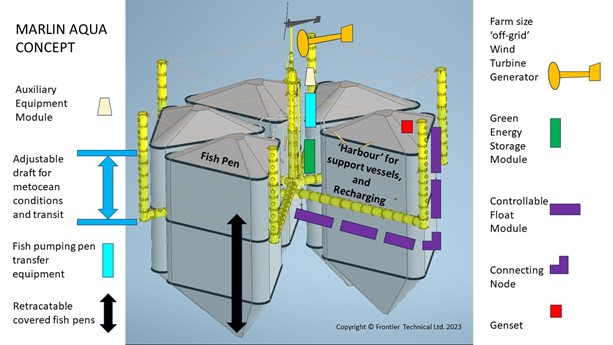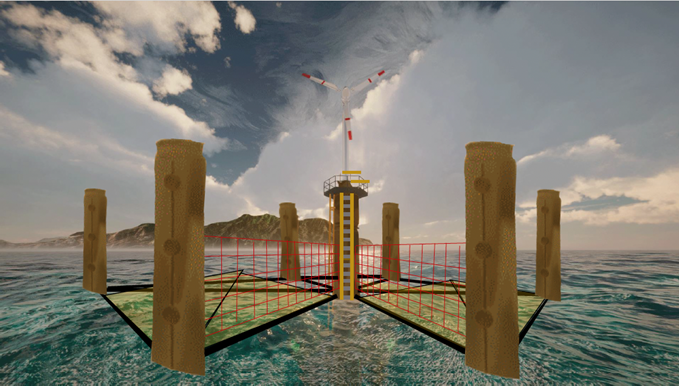MARLIN AQUA: Sustainable energy access for offshore aquaculture
This project explored a modular approach to renewable energy generation in conjunction with aquaculture in high-energy/offshore locations.
Project team
Project Lead
Frontier Technical
Grant Funder
Innovate UK Design Foundations July 2022. The aim of the competition was to help businesses develop new ideas that will deliver benefits for people and the planet, aligned with the UN’s Sustainable Development Goals – for new or significantly improved products, services, places or business models.
Steering Group - providing in-kind support:
Sustainable Aquaculture Innovation Centre (SAIC)
Fort William Underwater Trials Centre (FWUTC)
Centre for Innovation Excellence in Livestock (CIEL)
Subcontracted support
Blackfish Engineering
Holland Gubb
Morek Engineering
Impact
MARLIN AQUA has now progressed to a stage that will allow the formation of a project team with manufacturers and suppliers to apply for further funding in order to trial prototypes and realise practical custom solutions.
£92,480
Total value
Case study
Download PDF
This project explored a modular approach to renewable energy generation in conjunction with aquaculture in high-energy/offshore locations. In close engagement with sector experts, the project considered conceptual and practical implications for farming operations and fish health and welfare, as well as optimal design, technology and engineering.
BACKGROUND
Aquaculture strives to provide a significant proportion of food for global populations and, in this context, helps efforts to strengthen food security and to promote sustainable economic growth, consumption and production, as well as to support global partnerships for sustainable development. A key area identified for future development of the sector includes expansion plans in offshore operations. Shifting operations to deeper water may have the potential to positively impact water quality management and disease control while reducing the level of reliance on fossil fuels. However, along with this comes several practical challenges associated with offshore aquaculture.
This project, MARLIN AQUA, is led by UK-based technology developer Frontier Technical, a company that specialises in floating offshore renewable energy. The project aims to overcome the challenges of oceanic aquaculture by applying a 'Modular System Approach' enabling offshore floating platform configurations to be designed, assembled, and installed that directly respond to the customers’ operational needs and constraints. Floating offshore wind for aquaculture is a new concept and has primarily focussed on the application of utility-scale turbines. However, smaller individual products are feasible, and the modular approach reduces installation costs enabling transport of modules and connecting nodes by conventional road and rail.
Frontier Technical will explore with key industry stakeholders, including farm owners/operators, regulators and academics, the challenges, issues, and pressures within the aquaculture sector to inform the development of a platform designed based on their own practices/needs. Moreover, energy-related opportunities will be identified to improve cost-effective installation, operation, and maintenance of the generating equipment.
AIMS
- To use a ‘Design for NetZero’ systematic approach to design a platform that meets the needs of offshore aquaculture.
- To explore with key stakeholders the challenges and opportunities in the salmon aquaculture sector.
- To identify energy-related opportunities to improve cost-effective installation, operation, and maintenance of the generating equipment.
- To create credible concepts and a construction design.
Steering group and stakeholder engagement
Frontier Technical was introduced to the aquaculture sector through guidance from a project steering group that included industry experts from the Sustainable Aquaculture Innovation Centre (SAIC), Fort William Underwater Trials Centre Ltd, and the Centre for Innovation Excellence in Livestock (CIEL). Steering group consultations helped to give important industry background and to facilitate engagement with the sector. This informed a series of site visits and stakeholder interviews with key producers, regulators, academics, and suppliers. Stakeholder discussions focused on identifying energy-related opportunities along with understanding the limitations to current and future offshore developments, which allowed insight into the challenges faced both by the industry as a whole and on a technical operational level.
Concept design
Following this stakeholder engagement, a series of workshops were carried out in collaboration with Blackfish Engineering to develop ‘Voice of the Customer’ information into requirements using a Japanese KJ Analysis technique used in industrial design methodologies such as Six Sigma. The main requirements of the structural design were focused around enabling larger aquaculture sites to be situated further offshore, improvement of staff safety, reduction of carbon footprint, and incorporation of fully integrated architecture. From this, a series of concepts were considered and ultimately a ‘six-pointed star’ design was selected for further development and modelling (Figure 1).


Figure 1
Historical data from west of the Outer Hebrides were used by Morek Engineering to analyse and confirm appropriate seakeeping performance of the platform with nets and mooring system in regular and extreme metocean conditions.

Modules and connecting nodes configured as MARLIN AQUA semi-submersible offshore fish farm
The concept has been designed to provide an equivalent total volume of four times the capacity of typical 100m diameter pens used in Scotland. Nets are attached to vertical columns to provide stability, with further features for personnel access, energy storage, fish transfer, vessel recharging.
IMPACT
The initial concept ideation was presented to the steering group for review and to gain further insight into the key challenges of the design. MARLIN AQUA has now progressed to a stage that will allow the formation of a project team with manufacturers and suppliers to apply for further funding in order to trial prototypes and realise practical custom solutions. A prototype configured as a ‘SPAR buoy’ single-column floating energy platform was built in a previous Innovate UK project: MARLIN STAR - Stored and Transferable Energy for Coastal Communities’ and future trials in the heart of Scottish fish farming locations will further enhance sector engagement in the concept’s development and potential adoption.
ADDITIONAL INFORMATION
Dissemination has taken place via presentations at the following events:
- University of Plymouth COAST event and launch of Centre for Decarbonisation and Offshore Renewable Energy (C-DORE), 20 February 2023
- Marine-I Cornwall, April 2023
- SAIC Sustainable Aquaculture Summit, Glasgow 16-17 May 2023
- Blue Food Innovation Summit, London 23-24 May 2023